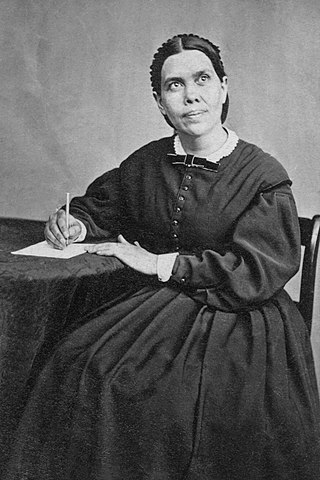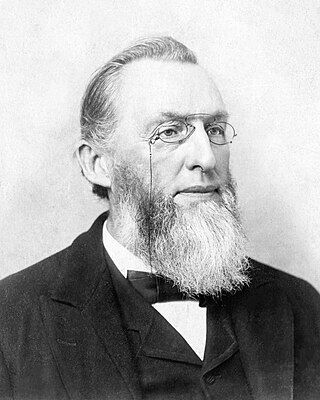
The Seventh-day Adventist Church (SDA) is an Adventist Protestant Christian denomination which is distinguished by its observance of Saturday, the seventh day of the week in the Christian (Gregorian) and the Hebrew calendar, as the Sabbath, its emphasis on the imminent Second Coming (advent) of Jesus Christ, and its annihilationist soteriology. The denomination grew out of the Millerite movement in the United States during the mid-19th century and it was formally established in 1863. Among its co-founders was Ellen G. White, whose extensive writings are still held in high regard by the church.

Ellen Gould White was an American author and co-founder of the Seventh-day Adventist Church. Along with other Adventist leaders such as Joseph Bates and her husband James White, she was instrumental within a small group of early Adventists who formed what became known as the Seventh-day Adventist Church. White is considered a leading figure in American vegetarian history. Smithsonian named her among the "100 Most Significant Americans of All Time".
Criticism of the Seventh-day Adventist Church includes observations made about its teachings, structure, and practices or theological disagreements from various individuals and groups.

Uriah Smith was a Seventh-day Adventist author, minister, educator, and theologian who is best known as the longest serving editor of the Review and Herald for over 50 years.
Most Seventh-day Adventists believe church co-founder Ellen G. White (1827–1915) was inspired by God as a prophet, today understood as a manifestation of the New Testament "gift of prophecy," as described in the official beliefs of the church. Her works are officially considered to hold a secondary role to the Bible, but in practice there is wide variation among Adventists as to exactly how much authority should be attributed to her writings. With understanding she claimed was received in visions, White made administrative decisions and gave personal messages of encouragement or rebuke to church members. Seventh-day Adventists believe that only the Bible is sufficient for forming doctrines and beliefs, a position Ellen White supported by statements inclusive of, "the Bible, and the Bible alone, is our rule of faith".
The 1888 Minneapolis General Conference Session was a meeting of the General Conference of Seventh-day Adventists held in Minneapolis, Minnesota, in October 1888. It is regarded as a landmark event in the history of the Seventh-day Adventist Church. Key participants were Alonzo T. Jones and Ellet J. Waggoner, who presented a message on justification supported by Ellen G. White, but resisted by leaders such as G. I. Butler, Uriah Smith and others. The session discussed crucial theological issues such as the meaning of "righteousness by faith", the nature of the Godhead, the relationship between law and grace, and Justification and its relationship to Sanctification.
George Raymond Knight is a leading Seventh-day Adventist historian, author, and educator. He is emeritus professor of church history at Andrews University. As of 2014 he is considered to be the best-selling and influential voice for the past three decades within the denomination.
James Rosco Nix was director of the Ellen G. White Estate from 2000-2020. As a young person he developed a collection of rare early Seventh-day Adventist materials and interviewed individuals who remembered Ellen G. White. Nix is recognized as a consummate storyteller of early Adventism who has worked tirelessly to protect Ellen White's writings.
Robert W. Olson was an American Seventh-day Adventist leader who was director of the Ellen G. White Estate from 1978 to 1990.
Paul Alfred Gordon was a Seventh-day Adventist. He was director of the Ellen G. White Estate from 1990 to 1995.
Arthur Lacey White (1907–1991) was an American Seventh-day Adventist writer, and theology professor, noted for his service to the Ellen G. White Estate.

William Clarence "Willie" White, was a son of Ellen G. White and James Springer White, two of the founders of the Seventh-day Adventist Church. He became a well-known Seventh-day Adventist minister and church leader. W.C.'s son Arthur L. White worked closely with him and succeeded his father as Secretary of the White Estate.
Francis David Nichol was a Seventh-day Adventist editor, of the church's main newsmagazine, and supervising editor of the Seventh-day Adventist Bible Commentary, author, and also chairman of the Ellen G. White Estate board of trustees, and considered the leading twentieth-century apologist for the prophetic ministry of Ellen G. White. In 1965, Walter Martin described him as "the most able Adventist apologist."
Ángel Manuel Rodríguez (1945—) is a Seventh-day Adventist theologian and was the director of the Biblical Research Institute (BRI) before his retirement. His special research interests include Old Testament, Sanctuary and Atonement, and Old Testament Theology. He has written several books, and authors a monthly column in Adventist World.
Arthur Nelson Patrick was a Seventh-day Adventist theologian and historian. At the time of death, he was an honorary senior research fellow at Avondale College in New South Wales, Australia. He also worked in pastoral ministry, evangelism, religion teaching, academic administration, and hospital chaplaincy for the Seventh-day Adventist church.
Charismatic Adventists are a segment of Adventism, specifically the Seventh-day Adventist Church, as well as some other Adventist denominations, such as the Adventist Church of Promise and the International Missionary Society of Seventh-Day Adventist Church Reform Movement, that is closely related to "Progressive Adventism", a liberal movement within the church.
Morris L. Venden was a prominent Seventh-day Adventist preacher, teacher, and author, who was also a member of the Voice of Prophecy team as an associate speaker.
Seventh-day Adventists believe that Ellen G. White, one of the church's co-founders, was a prophetess, understood today as an expression of the New Testament spiritual gift of prophecy.
Jack Wendell Provonsha was a Seventh-day Adventist Physician and ethicist.
Charles Scriven is a Seventh-day Adventist theologian who served as President of Kettering College from 2000 through 2013. He is a member of the Board of Directors of the Kettering foundation and chair of the board of Adventist Forums, publisher of Spectrum magazine.




